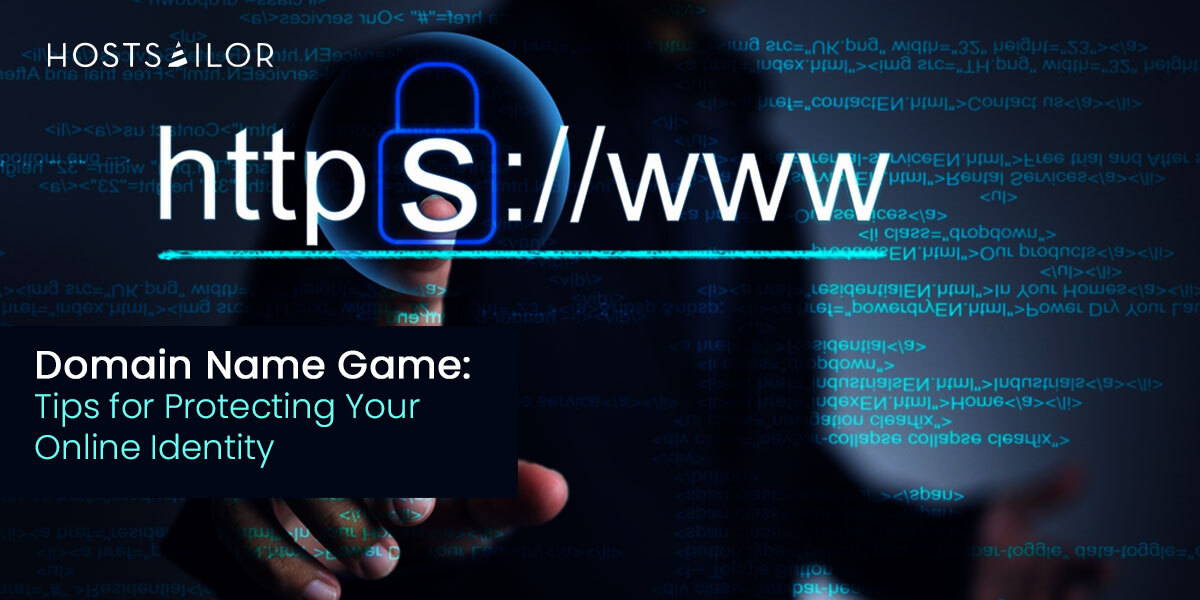
The broad digital environment is where your domain name performs as an address of your ‘physical location on the web,’ a unique identifier that leads people to your site, email, or online presence.

It’s your online storefront, your brand in the digital market, where everything is happening with lightning speed. That’s why protecting your physical identity comes in the first place and also why you should care about e-domain name protection in the digital environment.
Read Also.. Domain Name Decoded: Secrets to Finding Perfect Online Address
This article is designed to be your roadmap to the “domain name game,” where you will gain the know-how and tactics to secure your site name and provide you with the foundation to help you embark on your online journey.
Choosing Your Domain Name: Finding that middle ground
The right domain name is the starting point of protecting your online identity, which, in turn, should be distinguished by your needs, brand, or personal identity. Here are some key considerations to guide your choice:
- Relevance: Choose a brand name that includes content that is relevant to your website. This will let users know about your goals and will also increase the number of your website visitors who are most likely to become clients.
- Memorable: Decide on a name that will be easy to remember and type. This will give you a good chance to rank on the first page of Google. Avoid writing complex combinations, and hyphens.
- Brandability: Think about whether the name speaks for your brand and whether it can help you grow afterward.
- Availability: Make sure that the domain name you want to have is available for registration. You can do this by conducting a thorough search on domain name registrars or online tools.
- Length: Ensure that your domain name is short and not more than 14 characters long so that people can recollect the name and read it easily.
- Keywords: It is not necessary but adding the mentioned keywords will help in enhancing the visibility of your article on search engines to the minimum level. However, ensure that your key phrases are easily understood and easy to remember rather than overly stuffed with words.
Securing Your Domain Name: Raise a Fortress
Once you’ve chosen your domain name, it’s time to secure it through proper registration and implementation of essential protective measures:
- Domain Registration: Consider a trusted domain registrar and register your domain name in its integrity with the correct contact information. This creates your equation and guards against captioning with others. Use our artificial intelligence (AI) tool for a smarter, quicker, and more effective essay writing experience.
- Domain Privacy Protection: One of the measures including adding domain privacy protection you can take to conceal your personal contact information from the public is domain privacy protection. It is a Spam guard and has privacy security.
- Strong Passwords: Make use of strong, distinctive passwords for your domain registrar account as well as any email login that is associated with it. Instill two-factor authentication for extra security purposes.
- Regular Renewal: Configure and set up automatic renewal for your domain name to prevent prospect accidental expiration and eventual loss of your domain name.
Going Beyond the Basics: Advances in Security Assumptions
For those seeking an extra layer of security, consider these additional measures:
- Domain Locking: To enable locking, specify the domain name so that unauthorized transfers or modifications are impossible.
- Monitoring Services: Let domain monitoring services do this job by entering the website name for monitoring and tracking unauthorized changes or attempts to register similar domain names.
- Brand Protection: If you have trademarked your brand name, then protect your domain name with a trademark as well. It will further assist you in ensuring a reliable online presence.
Domain Name Scams: How To Spot Tricksters from Scammers
Be wary of common domain name scams that can compromise your online security:
- Typosquatting: Crooks register domain names that sound like yours and hope that users type wrongly and end up on their site, then become victims of malware or security threats like phishing.
- Renewal Scams: Scammers send spurious emails claiming the domain name you own expires within the timeframe, then demand you to click on the links or renew the domain name with higher renewal fees. Always remember that a reliable domain name registrar is your best source of information.
- Domain Name Tasting: Malicious programmers registered the domain names that they intended to exploit later by selling those for extremely high prices to bona fide businesses or individuals.
Keeping yourself informed and practicing being cautious will help you beat the most online dangers.
Building a Strong Digital Foundation: Conversing is the future of the web
While domain name protection forms a crucial aspect of online security, it’s essential to adopt a holistic approach to safeguarding your digital identity:
- Website Security: Adopt robust website security protocols that can solve issues such as malware, data breaches, and cyber-attacks.
- Social Media Awareness: However, be judicious and choose wisely about the content and the audience you are sharing your personal information on social media platforms and set your privacy settings appropriately.
- Data Protection: Pay keen interest to the information you are gathering from your users and utilize safeguarding of data to ensure that their personal information remains private.
- Phishing Awareness: Teach yourself and others through warning signs about phishing and how to identify them and thus how to avoid personal data or username and password divulgation.
Through domain name protection and digital security practices, you can create a robust digital presence. At the same time, you can obtain a haven for personal and professional exercises that provide you with an all-around, healthily protected space to play.